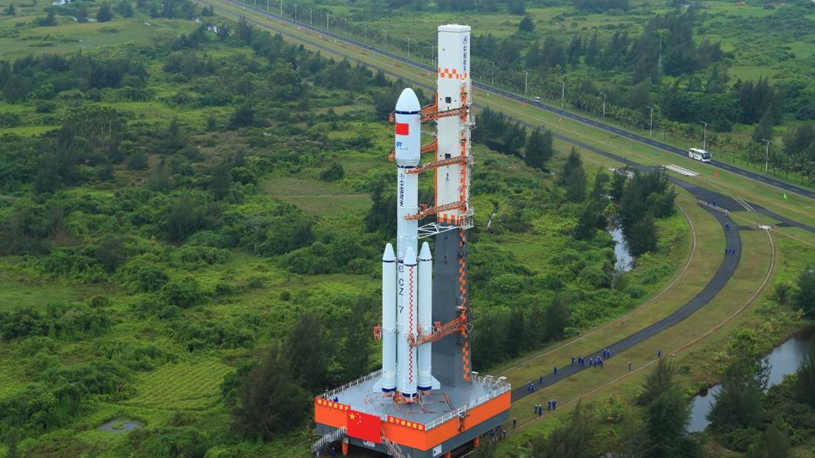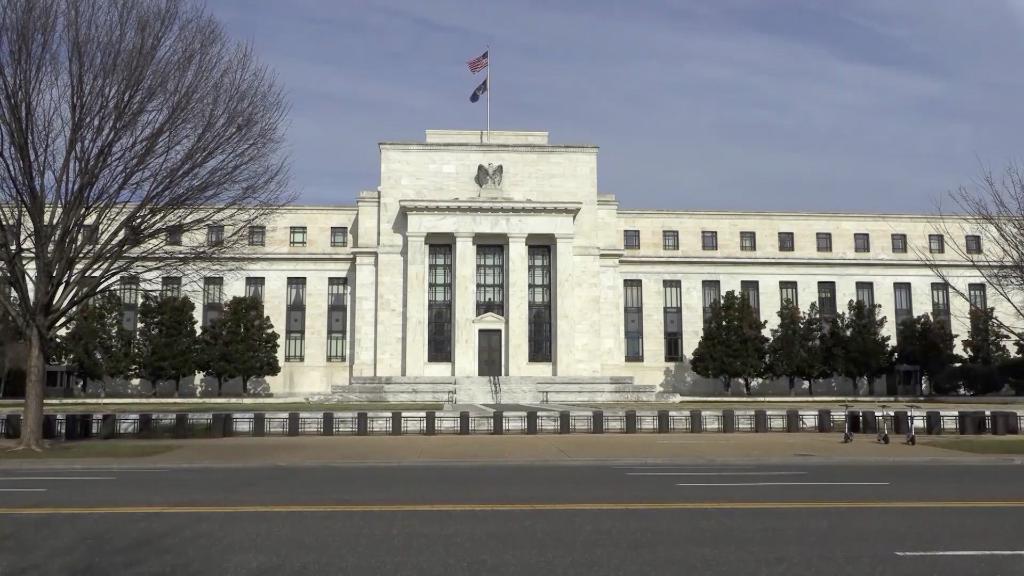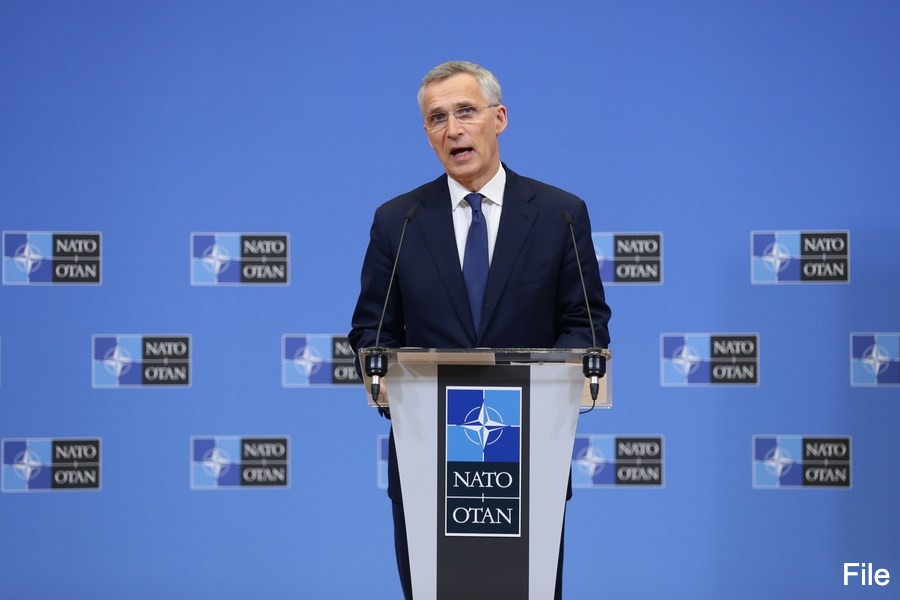
NATO Secretary General Jens Stoltenberg speaks at a press conference after a meeting of NATO Ministers of Foreign Affairs at the NATO headquarters in Brussels, Belgium, April 7, 2022. (Xinhua/Zheng Huansong)
If NATO expands northwards and incorporates Finland and Sweden into its military alliance, it will undoubtedly intensify confrontation with Russia and lead to further deterioration of the regional security situation, analysts say.
STOCKHOLM, May 9 (Xinhua) -- Finnish President's office has confirmed recently that President Sauli Niinisto would state his position on Finland's NATO membership no later than May 12.
Meanwhile, Tobias Baudin, secretary-general of the ruling Swedish Social Democratic Party, said the party would probably issue a final decision on Sweden's NATO membership on May 15.
Analysts believe that NATO's eastward expansion after the Cold War has increasingly pushed Russia into a corner and failed to make Europe safer.
If NATO expands northwards and incorporates Finland and Sweden -- two Nordic countries with longstanding neutral and military non-alignment policies -- into its military alliance, it will undoubtedly intensify confrontation with Russia and lead to further deterioration of the security situation in the Baltic Sea region and Europe as a whole, analysts say.
POTENTIAL NEW MEMBERS
A formal decision for Finland to join NATO will follow a joint meeting of the president and governmental committee on foreign and security policy. Finland shares a more than 1,300-km border with Russia.
Finnish media have widely speculated that President Niinisto would support Finland's NATO membership.
In neighboring Sweden, parliamentary parties are also in heated discussions over the issue. Most members of parliament have expressed their support for Sweden joining the bloc, except for the Left Party and the Green Party.
Sweden Democrats, the country's third-largest party, which previously opposed NATO membership, recently modified its stance, saying it would support Sweden's application if Finland finally decides to join.
On Wednesday, Baudin told TT news agency that the party board would hold an extra meeting on its NATO membership decision on May 15, a date brought forward from the previously scheduled May 24. Baudin also said that Niinisto would arrive in Stockholm on May 17 for a state visit.
Mats Knutson, a domestic political commentator, said recently in an article on Swedish Television SVT that the Swedish Social Democrats' agenda is closely in line with Finland's decision-making agenda, suggesting that Sweden and Finland are coordinating on whether to join NATO. Several Swedish media outlets have speculated that Sweden and Finland may submit their NATO applications together during the NATO summit in Madrid between June 28 and 30.
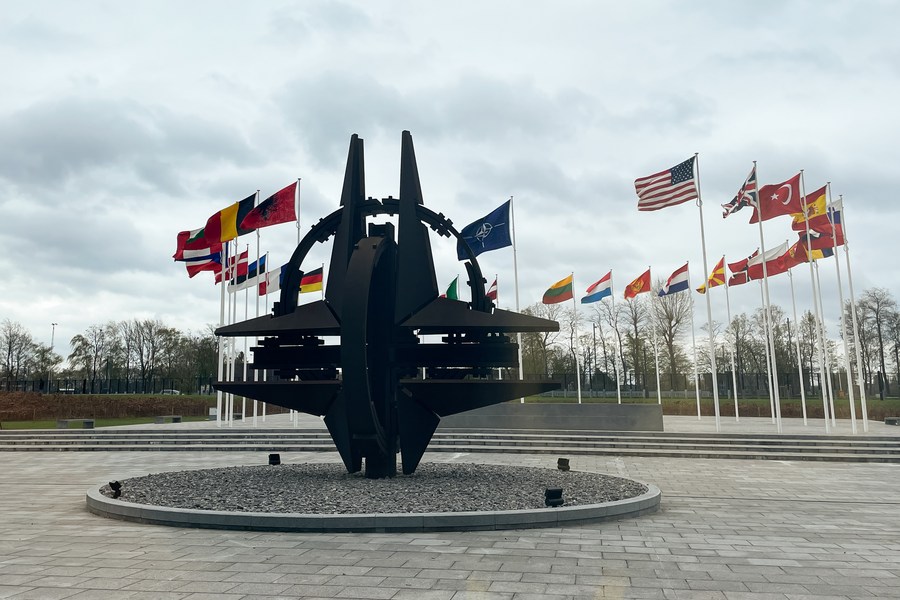
Photo taken on April 6, 2022 shows a sculpture and flags at NATO headquarters in Brussels, Belgium. (Xinhua/Zheng Huansong)
NATO and the United States, Germany and other countries have supported the two potential new Nordic members. In an interview with SVT Thursday, NATO Secretary General Jens Stoltenberg said Sweden could expect an increased presence of NATO troops in the Baltic Sea and around the rest of the country when a possible NATO application is processed.
German Chancellor Olaf Scholz said recently that Sweden and Finland "can count on our support" if they decide to join NATO.
After meeting with U.S. Secretary of State Antony Blinken, Swedish Foreign Minister Ann Linde told Swedish media on Wednesday that the United States was ready to provide "security assurances" to Sweden during a possible application process to NATO.
However, not all voices within NATO are welcoming. Croatian President Zoran Milanovic said Tuesday that he would block the admission of Sweden and Finland at the NATO summit in Madrid, adding that NATO should first solve some problems in the Balkans before accepting the two countries.
ESCALATING TENSIONS AGAINST RUSSIA
Since the end of the Cold War, NATO, led by the United States, has repeatedly tried to woo Sweden and Finland to the military bloc. The two countries joined NATO's Partnership for Peace program in 1994, but they also cooperate with Russia on climate and security.
Analysts say that NATO has continued to expand eastward after the end of the Cold War, squeezing Russia's strategic space and alienating Russia-Ukraine relations by inciting "color revolutions," ultimately triggering the current Ukraine crisis.
NATO continued to add fuel to the fire before and after the escalation of the Russian-Ukrainian conflict, attempting to use Ukraine to weaken and even bring down Russia, they say.
If Finland and Sweden join NATO, it is bound to increase Russia's sense of insecurity further and trigger corresponding countermeasures, further deteriorating the security situation in Europe, analysts believe.
Sergei Markov, general director of the Moscow-based Institute for Political Studies, told Xinhua recently that the United States is actively encouraging Finland and Sweden to join NATO, with consequences for global security.
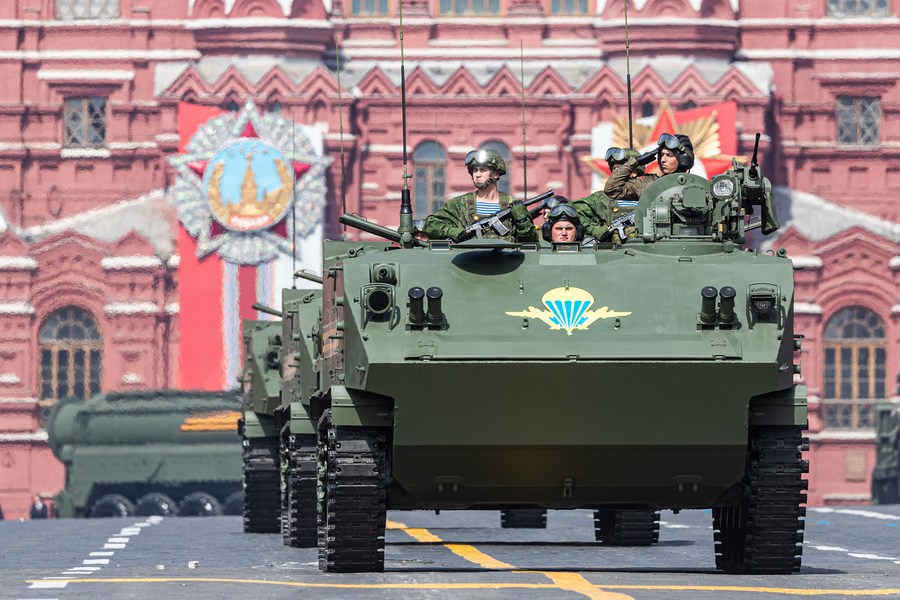
Infantry fighting vehicles are seen on Red Square during a rehearsal of the Victory Day parade in Moscow, Russia, May 7, 2022. (Xinhua/Bai Xueqi)
If NATO expands further and deploys large-scale military forces in areas close to the Russian border, it will dramatically change the political and security situation. Russia will have to take measures to ensure its own security, he said.
Deputy Chairman of the Russian Security Council Dmitry Medvedev said last month that Russia would have to strengthen its land, naval and air forces in the Baltic Sea should Sweden and Finland join NATO, adding, "there can be no more talk of any nuclear-free status for the Baltics -- the balance must be restored."
U.S. foreign affairs columnist Jonathan Power recently said that Sweden's plan to join NATO is playing with fire and will make Sweden less secure.
Thomas Wallgren, professor of philosophy at the University of Helsinki, said on April 11 in a column that Finland joining NATO would be a rash and dangerous mistake and would significantly increase the country's security risks.
Zhang Jun, China's permanent representative to the United Nations, emphasized Thursday at a UN Security Council meeting that the "security of all countries is indivisible." To base one country's security on the insecurity of other nations is neither reasonable nor operable, he said.
Given that the Cold War ended decades ago, NATO should "naturally size up the situation and make necessary adjustments," Zhang said. ■


